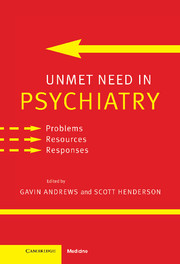Crossref Citations
This Book has been
cited by the following publications. This list is generated based on data provided by Crossref.
Henderson, Scott
Andrews, Gavin
and
Hall, Wayne
2000.
Australia's Mental Health: An Overview of the General Population Survey.
Australian & New Zealand Journal of Psychiatry,
Vol. 34,
Issue. 2,
p.
197.
Christensen, Helen
and
Griffiths, Kathleen
2000.
The Internet and Mental Health Literacy.
Australian & New Zealand Journal of Psychiatry,
Vol. 34,
Issue. 6,
p.
975.
Henderson, Scott
Andrews, Gavin
and
Hall, Wayne
2000.
Australia's Mental Health: An Overview of the General Population Survey.
Australian & New Zealand Journal of Psychiatry,
Vol. 34,
Issue. 2,
p.
197.
Hickie, Ian B
Davenport, Tracey A
Scott, Elizabeth M
Hadzi‐Pavlovic, Dusan
Naismith, Sharon L
and
Koschera, Annette
2001.
Unmet need for recognition of common mental disorders in Australian general practice.
Medical Journal of Australia,
Vol. 175,
Issue. S1,
Andrews, Gavin
Henderson, Scott
and
Hall, Wayne
2001.
Prevalence, comorbidity, disability and service utilisation.
British Journal of Psychiatry,
Vol. 178,
Issue. 2,
p.
145.
Andrews, Gavin
Issakidis, Cathy
and
Carter, Greg
2001.
Shortfall in mental health service utilisation.
British Journal of Psychiatry,
Vol. 179,
Issue. 5,
p.
417.
Jacobi, Frank
Wittchen, Hans‐Ulrich
Hölting, Christoph
Sommer, Sieghard
Lieb, Roselind
Höfler, Michael
and
Pfister, Hildegard
2002.
Estimating the prevalence of mental and somatic disorders in the community: aims and methods of the German National Health Interview and Examination Survey.
International Journal of Methods in Psychiatric Research,
Vol. 11,
Issue. 1,
p.
1.
Henderson, Scott
2002.
The National Survey of Mental Health and Well-Being in Australia: Impact on Policy.
The Canadian Journal of Psychiatry,
Vol. 47,
Issue. 9,
p.
819.
Alonso, J.
Ferrer, M.
Romera, B.
Vilagut, G.
Angermeyer, M.
Bernert, S.
Brugha, T.S.
Taub, N.
Mccolgen, Z.
Girolamo, G. De
Polidori, G.
Mazzi, F.
Graaf, R. De
Vollebergh, W.A.M.
Buist‐Bowman, M.A.
Demyttenaere, K.
Gasquet, I.
Haro, J. M.
Palacín, C.
Autonell, J.
Katz, S. J.
Kessler, R.C.
Kovess, V.
Lépine, J.P.
Arbabzadeh‐Bouchez, S.
Ormel, J.
and
Bruffaerts, R.
2002.
The European Study of the Epidemiology of Mental Disorders (ESEMeD/MHEDEA 2000) project: rationale and methods.
International Journal of Methods in Psychiatric Research,
Vol. 11,
Issue. 2,
p.
55.
HUMPHREYS, KEITH
2003.
Systems for planning and delivering services for Alcohol‐related problems: System‐level thinking much needed. Comment on Chapter 12: Treatment and early intervention services.
Addiction,
Vol. 98,
Issue. 10,
p.
1362.
Blashki, Grant
Hickie, Ian B
and
Davenport, Tracey A
2003.
Providing psychological treatments in general practice: how will it work?.
Medical Journal of Australia,
Vol. 179,
Issue. 1,
p.
23.
McGorry, Patrick D.
and
Yung, Alison R.
2003.
Early Intervention in Psychosis: An Overdue Reform.
Australian & New Zealand Journal of Psychiatry,
Vol. 37,
Issue. 4,
p.
393.
Lin, Elizabeth
Woodside, D Blake
and
Rhodes, Anne
2003.
The Canadian Psychiatric Association Practice Profile Survey: I. Methods and General Sample Characteristics.
The Canadian Journal of Psychiatry,
Vol. 48,
Issue. 4,
p.
237.
Goldney, Robert
Hawthorne, Graeme
and
Fisher, Laura
2004.
Is the Australian National Survey of Mental Health and Wellbeing a Reliable Guide for Health Planners? A Methodological Note on the Prevalence of Depression.
Australian & New Zealand Journal of Psychiatry,
Vol. 38,
Issue. 8,
p.
635.
Marie, Dannette
Forsyth *, Darryl K.
and
Miles, Lynden K.
2004.
Categorical Ethnicity and Mental Health Literacy in New Zealand.
Ethnicity & Health,
Vol. 9,
Issue. 3,
p.
225.
Finlayson, Marcia
Denend, Toni Van
and
Shevil, Eynat
2004.
Multiple Perspectives on the Health Service Need, Use, and Variability Among Older Adults with Multiple Sclerosis.
Occupational Therapy In Health Care,
Vol. 17,
Issue. 3-4,
p.
5.
Thompson, Anna
Hunt, Caroline
and
Issakidis, Cathy
2004.
Why wait? Reasons for delay and prompts to seek help for mental health problems in an Australian clinical sample.
Social Psychiatry and Psychiatric Epidemiology,
Vol. 39,
Issue. 10,
p.
810.
Goldney, Robert
Hawthorne, Graeme
and
Fisher, Laura
2004.
Is the Australian National Survey of Mental Health and Wellbeing a Reliable Guide for Health Planners? A Methodological Note on the Prevalence of Depression.
Australian & New Zealand Journal of Psychiatry,
Vol. 38,
Issue. 8,
p.
635.
Alonso, J.
Angermeyer, M. C.
Bernert, S.
Bruffaerts, R.
Brugha, T. S.
Bryson, H.
de Girolamo, G.
de Graaf, R.
Demyttenaere, K.
Gasquet, I.
Haro, J. M.
Katz, S. J.
Kessler, R. C.
Kovess, V.
Lépine, J. P.
Ormel, J.
Polidori, G.
Russo, L. J.
Vilagut, G.
Almansa, J.
Arbabzadeh‐Bouchez, S.
Autonell, J.
Bernal, M.
Buist‐Bouwman, M. A.
Codony, M.
Domingo‐Salvany, A.
Ferrer, M.
Joo, S. S.
Martínez‐Alonso, M.
Matschinger, H.
Mazzi, F.
Morgan, Z.
Morosini, P.
Palacín, C.
Romera, B.
Taub, N.
and
Vollebergh, W. A. M.
2004.
Use of mental health services in Europe: results from the European Study of the Epidemiology of Mental Disorders (ESEMeD) project.
Acta Psychiatrica Scandinavica,
Vol. 109,
Issue. s420,
p.
47.
2004.
Psychiatric and Mental Health Nursing: The Field of Knowledge.
p.
179.



